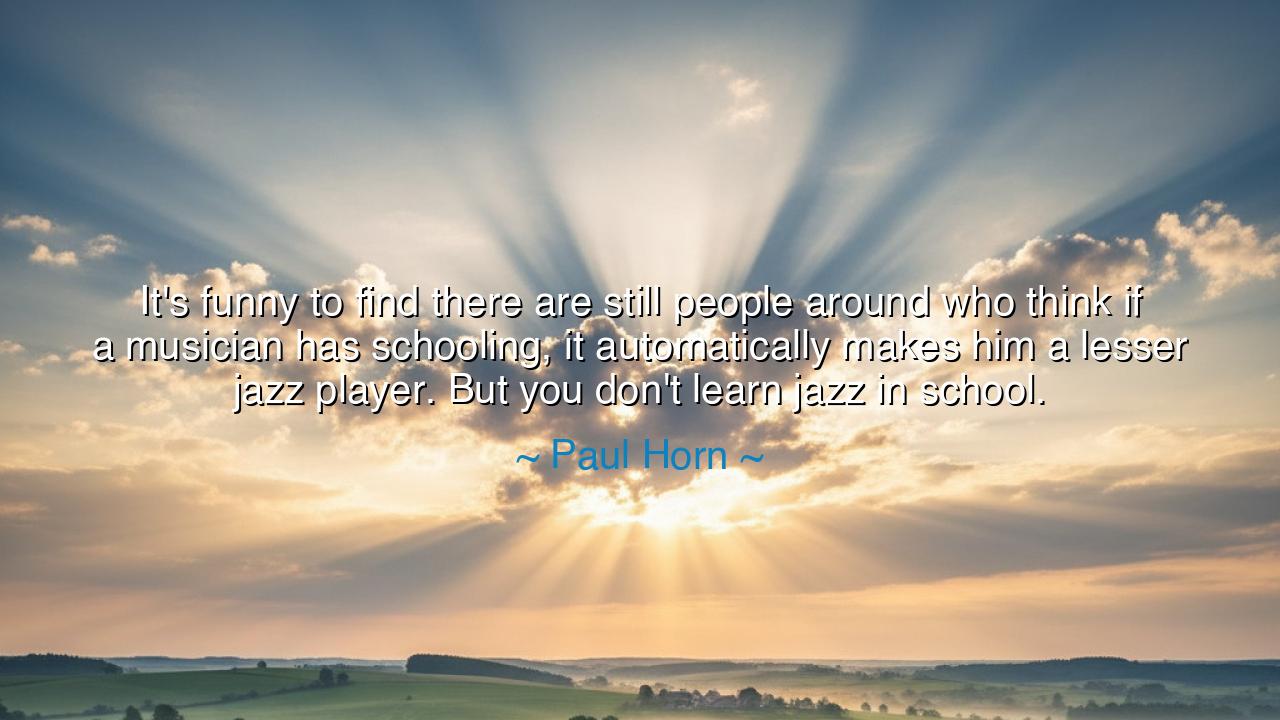
It's funny to find there are still people around who think if a
It's funny to find there are still people around who think if a musician has schooling, it automatically makes him a lesser jazz player. But you don't learn jazz in school.






“It’s funny to find there are still people around who think if a musician has schooling, it automatically makes him a lesser jazz player. But you don’t learn jazz in school.” — so spoke Paul Horn, the great flautist and spiritual pioneer of sound, whose music traveled from smoky jazz clubs to the silent halls of India’s Taj Mahal. In these words, he does not mock education, but reminds us that wisdom and soul are not born merely from instruction. He speaks to the eternal divide between knowledge and understanding, between the mastery of technique and the awakening of spirit. To Horn, and to all who have walked the path of creation, jazz is not a subject one studies — it is a language one lives.
When Horn says, “You don’t learn jazz in school,” he calls back to the ancient truth that art — true art — cannot be contained by walls, nor passed down in books alone. The ancients understood this well. The sculptors of Greece, the poets of India, the musicians of Egypt — all learned their craft not only from masters, but from life itself: from love and loss, from silence and sound, from watching the rhythm of the seasons and the pulse of humanity. Jazz, to Horn, was that same pulse — spontaneous, unpredictable, divine. It is not merely the reading of notes, but the feeling between them; not the written chord, but the conversation of souls through rhythm.
And yet, his words also confront the arrogance of those who scorn the disciplined artist. “It’s funny to find there are still people around who think if a musician has schooling, it automatically makes him a lesser jazz player.” Here, Horn speaks against a false belief — that structure kills spontaneity, that study dulls passion. The ancients never separated discipline from freedom. The samurai trained endlessly, not to become mechanical, but to act without hesitation. The poet memorized the forms of verse so that, when inspiration struck, his words flowed like water. So too with jazz: technique is not the cage but the key. Knowledge, when absorbed into the body and soul, becomes intuition.
Horn himself was both scholar and seeker. He studied at the Royal Conservatory of Music, yet his heart led him to the improvisational fires of jazz, and later to the meditative realms of sacred sound. His life became a bridge between discipline and spirit, between precision and surrender. The ancients would have called this the path of the artist-philosopher — one who learns the rules only to transcend them. To those who mocked trained musicians, Horn offered this wisdom: a school may teach you the scales, but only life can teach you how to play them with truth.
Consider the great Miles Davis, whose music defied every boundary yet was rooted in profound knowledge. Davis once said, “Man, sometimes it takes you a long time to sound like yourself.” This is the essence of Horn’s teaching. Education may give you tools, but self-knowledge gives you a voice. Without that voice, even the most skilled performer is silent. With it, even a single note can become eternal. Jazz, in this sense, is not a genre but a way of being — a meditation in motion, a dialogue with the unknown.
There is also humility in Horn’s words. He does not claim that schooling is useless, only that schools cannot teach the soul. The ancients, too, warned of this: Socrates said that wisdom cannot be poured into a man like water into a vessel. It must awaken from within. A teacher may show the path, but the walking must be done by the student himself. So it is with music. The teacher can show the scale, the form, the rhythm — but the swing, the breath, the life — those must come from the heart, and the heart is shaped not in lecture halls but in the great classroom of experience.
So let this teaching be passed down: Honor both your training and your spirit. Learn the craft, but do not mistake craft for creation. Let knowledge serve the fire within, not smother it. Study diligently, but then let go — for art, like jazz, is born in the moment when the mind yields to the soul. As Paul Horn reminds us, you don’t learn jazz in school, because the true music of life is not written on paper, but felt in the spaces between — in the laughter, the loss, the silence, and the courage to improvise when the melody changes. In this, all of life becomes a song — one you must learn not to memorize, but to live.






AAdministratorAdministrator
Welcome, honored guests. Please leave a comment, we will respond soon